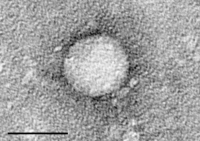
Photo from wikipedia
Background The hepatitis B virus (HBV) is one of the leading causes of acute, chronic and occult hepatitis (OBI) representing a serious public health threat. Cytokines are known to be… Click to show full abstract
Background The hepatitis B virus (HBV) is one of the leading causes of acute, chronic and occult hepatitis (OBI) representing a serious public health threat. Cytokines are known to be important chemical mediators that regulate the differentiation, proliferation and function of immune cells. Accumulating evidence indicate that the inadequate immune responses are responsible for HBV persistency. The aim of this study were to investigate the cytokines IFN-γ, TNF-α, IL-2, IL-4, IL-6, IL-10 and IL-17A in patients with OBI and verify if there is an association between the levels of these cytokines with the determination of clinical courses during HBV occult infection. Methods 114 patients with chronic hepatitis C were investigated through serological and molecular tests, the OBI coinfected patients were subjected to the test for cytokines using the commercial human CBA kit. As controls, ten healthy donors with no history of liver disease and 10 chronic HBV monoinfected patients of similar age to OBI patients were selected. Results Among 114 HCV patients investigated, 11 individuals had occult hepatitis B. The levels of cytokines were heterogeneous between the groups, most of the cytokines showed higher levels of production detection among OBI/HCV individuals when compared to control group and HBV monoinfected pacients. We found a high level of IL-17A in the HBV monoinfected group, high levels of TNF-α, IL-10, IL-6, IL-4 and IL-2 in OBI/HCV patients. Conclusion These cytokines could be involved in the persistence of HBV DNA in hepatocytes triggers a constant immune response, inducing continuous liver inflammation, which can accelerate liver damage and favor the development of liver cirrhosis in other chronic liver diseases.
Journal Title: Virology Journal
Year Published: 2021
Link to full text (if available)
Share on Social Media: Sign Up to like & get
recommendations!